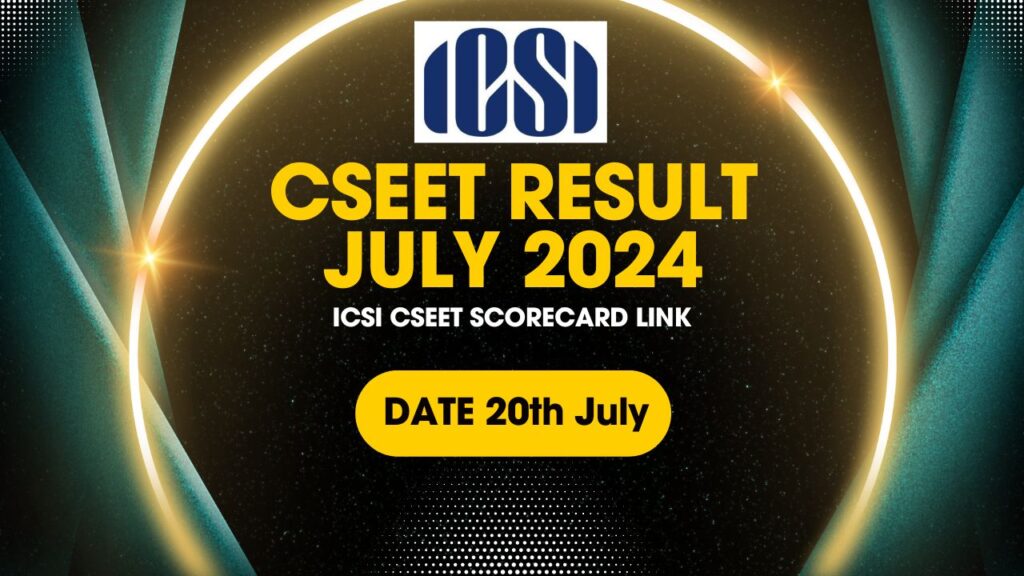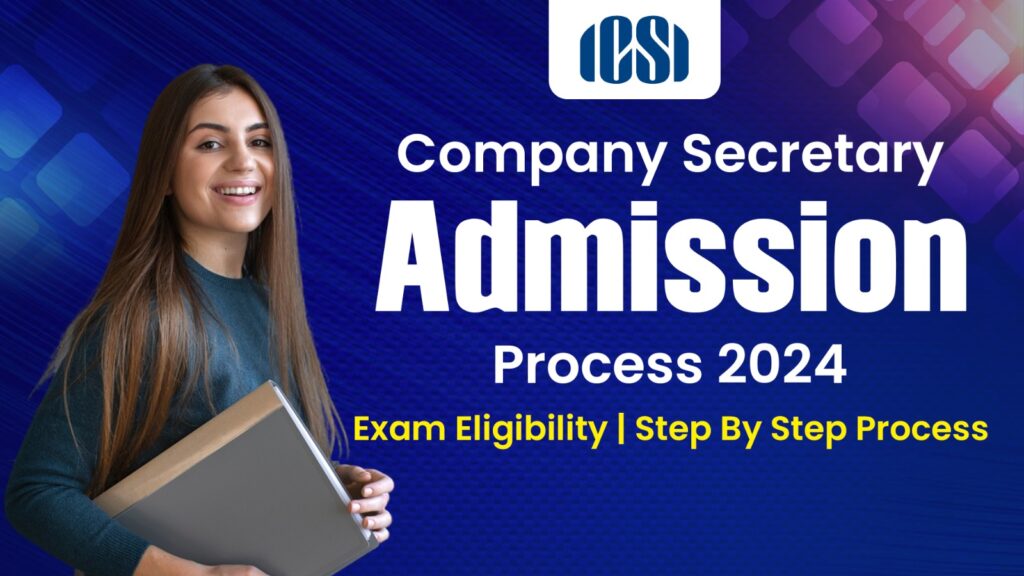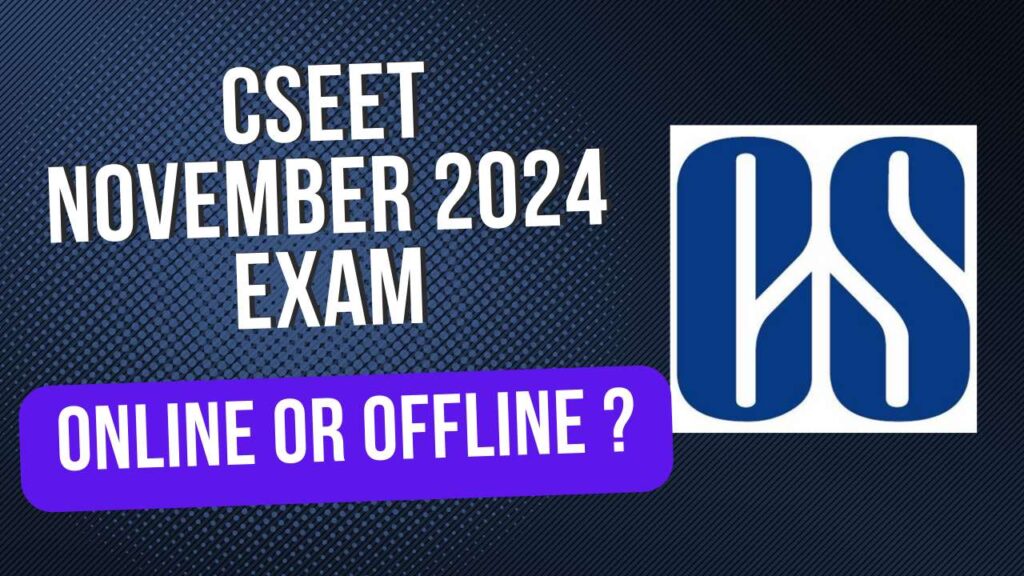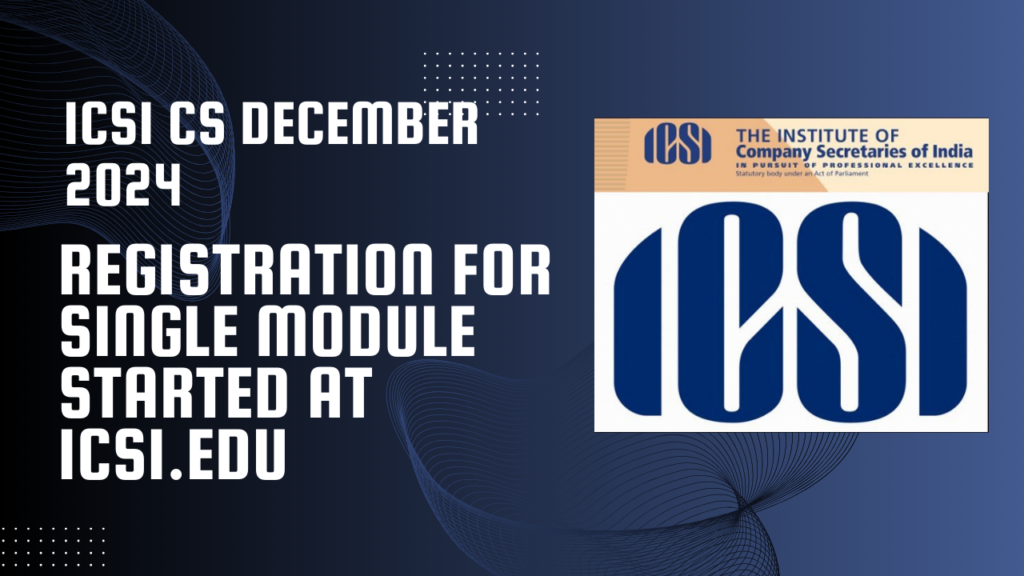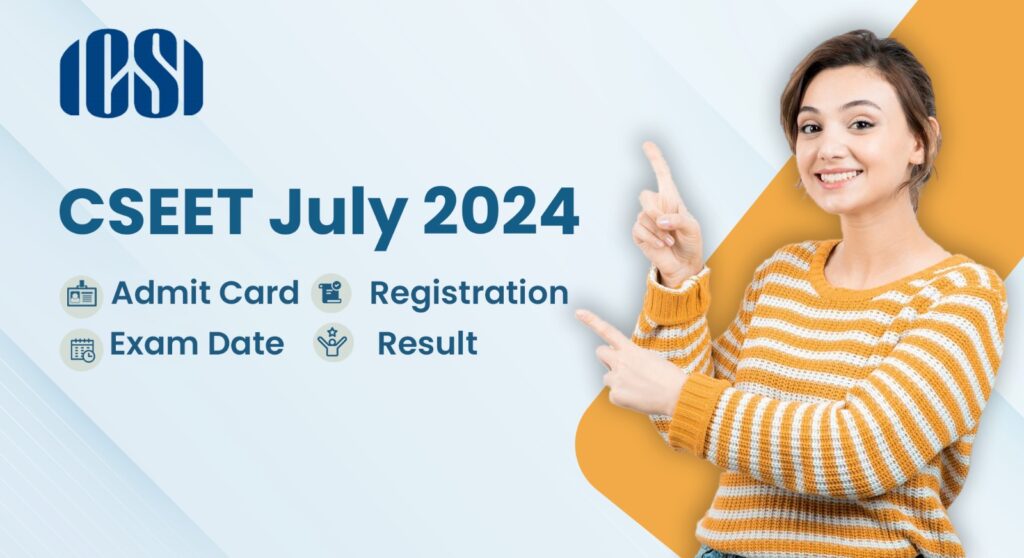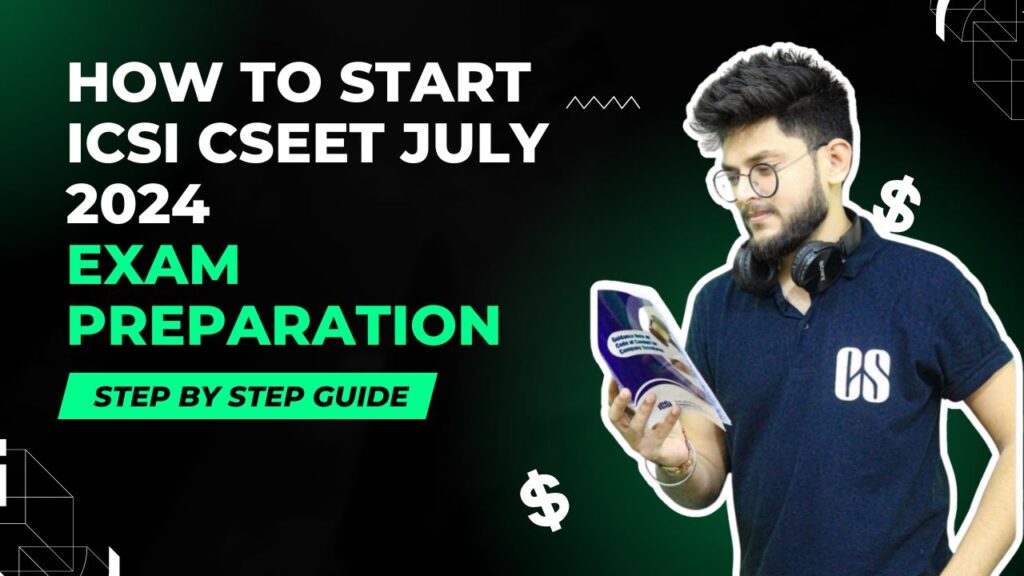“ICSI CSEET is the qualifying entrance test for registration to the CS Executive Programme” conducted by the Institute of Company Secretaries of India. This test is conducted 4 times in a year, mostly in the months of January, May, July & November. It’s a national level examination.
The language of the examination is English and the purpose of conducting this exam is to train and certify the candidates who aspire to become Company Secretaries. This exam being one of the most important exam for entering into this course of such a prestigious Institute of India.
Hence this requires adequate preparation, learning and planning. The students are required to plan the study in such a manner that the goal can be achieved and they should be able to crack this in 1st attempt itself.
Passing Criteria
Candidates are required to secure a minimum of 40% marks in each part, i.e., Paper- 1, Paper -2, Paper -3 and Paper -4 separately as the case may be, and 50% marks in aggregate of all parts put together for passing the Test .

There will be no negative marking for wrong answers. The minimum CS Executive Entrance Test percentage to be scored is 50%.
Syllabus
| Business Communication | Essentials of Good EnglishCommunicationBusiness Correspondence |
| Legal Aptitude and Logical Reasoning | Constitution of IndiaIndian Contract Act & Law of TortsElements of Company Secretaries LegislationElements of Company lawLogical ReasoningVerbal ReasoningNon verbal Reasoning |
| Economic and Business Environment | Basics of Demand and SupplyForms of Market CompetitionNational Income Accounting and related conceptsIndian Union BudgetIndian Financial MarketsIndian EconomyIndian EconomyBusiness EnvironmentKey Government Institutions |
| Current Affairs and Presentation and Communication Skills | Current Affairs of National and International SignificancePresentation skillsWritten Communication SkillsOral Communication Skills |
Paper wise Important Topics and Coverage
| Paper | Topic | Important Parts to be Covered |
| Business Communication | Essentials of Good English | English Grammar and its usage-Noun, Pronouns, Verbs, Adjectives, Adverbs, Prepositions, Conjunctions, Interjection, Voice, Articles, Tenses, Prefix and Suffix, Punctuations etc. Enriching Vocabulary-Choice of words, Synonyms and Antonyms • Common errors in English • Words with multiple meaning • One word substitution • Words frequently mis-spelt • Homophones • Idioms and phrases • Proverbs • Abbreviations • Para jumbles • Sentence completion • Sentence arrangement • Sentence correction • Foreign words and phrases commonly used • Comprehension of passage and art of Summarizing |
| Communication | Concept of Communication, Meaning and Significance of Good Communication Business Communication- Principles and Process Means of Communication- Written, Oral, Visual, Audio visual Choice of Modes of Communication Communication Networks- Vertical, Circuit, Chain, Wheel, Star Commonly used Mediums of Digital Communication- Email, SMS, Voice mail, Multimedia, Teleconferencing, Mobile Phone Conversation, Video Conferencing etc. Listening Skills-Types, Purpose, Steps to Effective Listening, Barriers to Effective Listening and Ways to overcome the Barriers Barriers to Effective Communication and Ways to overcome the Barriers | |
| Business Correspondence | Business Letters – Its Essentials, Parts, Types, SalutationsPositive Messages, Negative Messages and PersuasiveMessagesBusiness Reports, Inter and Intra-departmentalCommunication- Office Orders, Office Circulars,Memorandum, Office Notes, Management InformationSystem (MIS)Concept of Web, Internet and E-correspondenceIntranet- Benefit and PurposeEmail – Features, Procedure to Write a Formal Email, EmailEtiquettesEssential Elements of Email- Subject line, Formal Greeting,Target Audience (Reader), Clarity and Conciseness, FormalClosing, Proof reading, FeedbackAdvantages and Disadvantages of Email | |
| Common Business Terminologies | Terms defined under various Laws, Rules and Regulations including Financial and Non-Financial terms and expressions. | |
| Legal Aptitude and Logical Reasoning | Indian Constitution | Preamble• Citizenship• Fundamental Rights and Fundamental Duties• Directive Principles of State Policy• State under Constitution• President and GovernorsCouncil of Ministers and Prime Minister•Lok Sabha, Rajya Sabha and Legislative Assembly,Legislative Council• Supreme Court and High Courts• Landmark Amendment in Constitution• List of subjects-Centre, State and Concurrent |
| Elements of General Laws (Indian Contract Act and Law of Torts) | Law of ContractLaw of TortsOffer, Acceptance, Consideration andCompetency to Contract.AgreementTypes of Contract: Void, Voidable, UnenforceablePerformance of ContractFrustration of ContractQuasi ContractBreach of Contract and RemediesBasics of TortsSpecific DefensesNuisance and NegligenceStrict, Absolute and Vicarious LiabilityTrespassMalicious Prosecution | |
| Elements of Company Secretaries Legislation | Meaning and Nature of Company• Types of Companies• Incorporation of a Company• Types of capital• Board of Directors -(Concept, Appointment andRemoval of Directors)• Board Meetings & Shareholders MeetingsCorporate Social Responsibility• Business Ethics• Ethical Dilemma | |
| Legal Reasoning | Legal Fundamentals and Terms• Legal Problems – Reading and understanding a case• Legal Terminology and Maxims• Legal Reasoning-(a) Reasoning by Analogy(b) Inductive and Deductive Reasoning• Questions of Fact (or factual issues)• Questions of Law (or legal issues)• Landmark Judgments of Supreme Court and High Court• Reading Comprehension | |
| Logical Reasoning | Calendars• Cause and Effect Reasoning• Clocks• Coding and Decoding• Deriving Conclusion from Passages• Drawing Inference• Number Test• Sequence and Series• Statement and Assumptions | |
| Verbal Reasoning | Alphabet Test• Alpha Numeric Sequence Puzzle• Analogy• Assertion and Reason• Blood Relations• Decision Making• Inserting Missing Characters• Logical Sequence Test• Logical Venn Diagram• Number, Ranking and Time Sequence Test• Syllogism• Truth Tellers and Liars | |
| Non-Verbal Reasoning | Analytical Reasoning• Classification• Completion of Incomplete Pattern• Figure Matrix• Grouping of Identical Figures• Mirror Image• Rule Detection• Numeric and Alphabet Series | |
| Economic and Business Environment | Basics of Demand and Supply and Forms of Market Competition | Theory of Demand and SupplyEquilibrium PriceElasticity of Demand and Supply and other relatedconceptsIncrease and Decrease in Demand and Expansionand Contraction of DemandForms of Market Competition- Monopoly, Duopoly,Oligopoly, Perfect Competition and MonopolisticCompetition |
| National Income Accounting and Related Concepts | Meaning and methods to compute National Income• Key variables of National Income (GNP, GDP, NNP,NDP etc.) | |
| Indian Union Budget | Key terminologies / heads covered under the budgetRevenue and Capital BudgetMajor components of Revenue and Capital BudgetMeaning of Fiscal DeficitComponents/ Variables covered under Fiscal Deficit | |
| Indian Financial Markets | Overview of Indian Financial EcosystemKey facets of Indian financial systemGrowth of Financial InstitutionsPublic and private sector banksIndustrial Finance Corporation of India, SmallIndustries Development Bank of IndiaRegional Rural BanksCooperative BanksNon-Banking Finance CompaniesBasics of Capital Market: Types of Shares andDebenturesFinancial assistance scenario for Small and MediumEnterprises and Start-Ups. | |
| Indian Economy | Primary (Agriculture and allied activities)Secondary (Manufacturing)Tertiary (Services):Current scenario of agriculture and allied activities in IndiaAgricultural and Industrial Policies of IndiaCurrent scenario of services sector in IndiaBalance of PaymentsComponents of Balance of PaymentsFavorable and Unfavorable Balance of TradeForeign Investments in India- Types and Flows | |
| Entrepreneurship Scenario | Government initiatives to foster entrepreneurshipNeed for entrepreneurship in IndiaBottlenecks in entrepreneurial growth | |
| Business Environment | Overview of Business EnvironmentFeatures and factors influencing business environmentTypes of environment: Economic environment,Socio-cultural environment, Political environment,Legal and Technological environmentEase of Doing Business Index by World Bank forIndia and Department for Promotion of Industry andInternal Trade (DPIIT) for States | |
| Key Government Institutions | Basic awareness about various institutions and regulatory bodies in India such as NITI Aayog, MCA, SEBI, RBI, IBBI, CCI, NCLT/NCLAT etc | |
| Current Affairs and Presentation and Communication Skills | Current Affairs | Current affairs of national and internationalimportance relating to:• International bodies (ASEAN, BRICS, SAARC, G-20,BIMSTEC, etc.)• Organizations like, RBI, NABARD, CCI, IBBI, IMF,OECD, ADB, World Bank, etc.• Summits and conferences• Current development in Banking and Finance(digital banking, govt. initiatives, financialinclusion, etc.)• Current development in stock markets• Recent important judgments passed by SupremeCourt and High Courts of India, Tribunals• Current affairs related to CS Institute/Professionand regulatory bodies• Current updates on environment, bio-diversity,climate change and sustainable development• Latest developments in science and technology,IT, Computers and Space science• Business personalities and leaders• Committees and appointments• Art and culture• Books and their authors• Awards and honours• Sports• Current political scenario• Initiatives/ schemes of the government• Language and national symbolsGovernance and ethics• International diplomacy |
| Listening Skills | Questions based on audio clips– Monologue– Dialogue• Grammar Test• Vocabulary Test | |
| Written Communication Skills | Writing on a given topic• Correcting a given paragraph• Short Note writing• Essay writing• Precis writing | |
| Oral Communication Skills | Candidates are expected to:– Answer a question– Speak on a given topic– Explain the given term |
Books which can be referred
Considering this exam to be highly competitive and on national level, every student must prepare to qualify the same. ICSI has not exclusively recommended any of the reference books for preparing the examination and scoring excellent marks subject wise.
Although this is not an exhaustive list but students can definitely score good marks by referring these study books.
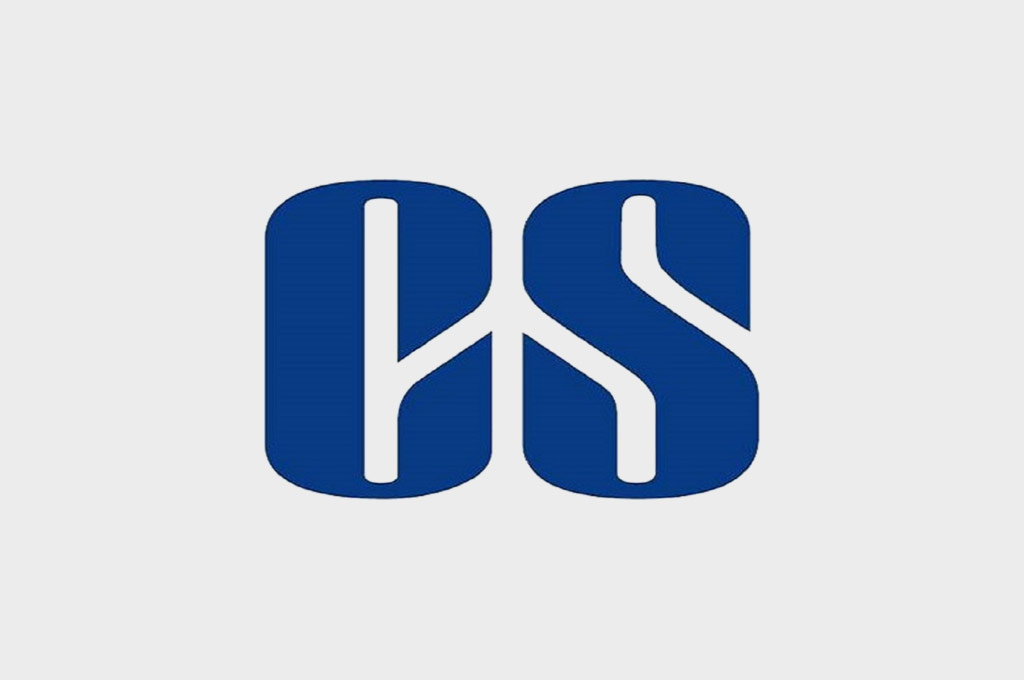
For instance
- For preparing the questions w.r.t Company Law, students can refer books from Taxmann publishers
- Even they can also find really good Multiple Choice Questions on Company Law from this publisher
- The conceptual understanding regarding Business Communication can be made from the ICSI study material only
- For understanding Business and Commercial laws, students can refer books of CS Anoop Jain
- For updating the knowledge w.r.t. current affairs, any periodicals, newspapers or journals can serve the purpose
Although students can also refer some of the previous year question papers for preparing well in the exam and consequently they can also prepare along with the speed and meeting the timeline requirement of clearing the exam.
But are we really prepared to crack this exam?
Following methodology is suggested for achieving the passing criteria and cracking the exam
- Understanding the CSEET Syllabus
- Making a Study Plan
- Journals and CSEET Bulletins released by ICSI
- Books
- Attending Classes
- Giving Mock Tests periodically
- Self Practice

1. Understanding Syllabus
ICSI has prescribed detailed syllabus w.r.t. each paper and content which will be part of the test. Following are the topics and subjects which are required to be part of the test.
Students are expected to understand and have a proper grip on the topics. A proper SWOT analysis should be done by the students w.r.t. topics. The focus should be more on the topics/ subjects which seems tough or difficult for them.
2. Making a Study Plan
This is another important prerequisite wherein students are expected to frame their daily learning hours. Making a proper time table has always been helpful for cracking any examination.
Hence it would also help here as well. These days a lot of teachers and mentors are using their You tube channels. This will also suggest students to derive their hourly or daily study routine. They can spread their topics over the span of next few days till 08th May 2021.
Students can also decide on the basis of the days of the week for allocation purpose. For example they can study each subject on hourly basis or each subject per day basis during the week.
3. Journals and CSEET Bulletins released by ICSI
ICSI releases monthly journals and newsletters for helping students preparing for this exam. Students should regularly refer these study materials for meeting the requirements of this exam.
Further this will also help them to understand the latest trends of this examination. The recent topics, case laws, examples of Industry practices and various other relevant material can be found and referred through theses journals.
4. Books which can be referred
This national level exam is considered as highly competitive. Every student must prepare to qualify the same.
ICSI has not exclusively recommended any of the reference books for preparing the examination. For scoring excellent marks subject wise, students can select good books. Although this is not an exhaustive list but students can definitely score good marks by referring these study books.
For instance
- For preparing the questions w.r.t Company Law, students can refer books from Taxmann publishers
- Even they can also find really good Multiple Choice Questions on Company Law from this publisher
- The conceptual understanding regarding Business Communication can be made from the ICSI study material only
- For understanding Business and Commercial laws, students can refer books of CS Anoop Jain
- For updating the knowledge w.r.t. current affairs, any periodicals, newspapers or journals can serve the purpose
Students can also refer some of the previous year question papers for preparing well in the exam. Consequently they can also prepare along with the speed and meeting the timeline requirement of clearing the exam.
5. Attending Classes
These days , various websites and you tube channels prescribe various modes of study and chapter wise/ topic wise/ importance wise notes for the reference of students. ICSI also on regular basis plan various types of classes and sessions for the better understanding of students.
Before reading further check out these posts:
Students can chose wisely what type of class they want to enrol into. They can decide which can help them to understand the topics or which can help them clearing their doubts.
6. Giving Mock Tests periodically
Mock tests usually help students to get familiar with style of examination or attempting the actual question paper.
As this is now an online paper and which can be given by sitting at home also, hence it can be a bit difficult for students to create examination type atmosphere at home. But with the mock tests they can also assess their speed of solving questions and can also ascertain the accuracy level used in the performance.
Various types of mock tests are available on various online platforms- some paid and some unpaid. Students can select any one but they should practice it as much as they can.
7. Self Practice
It is generally said that “Practice makes a man perfect”. This means that with regular practice of solving questions on their own , students can really reach to a level of accuracy along with speed.
Its very important that they should focus on self practice even after performing mock tests or online classes. Self practice and continuity of the same is one of the essential key to be successful in this examination.





